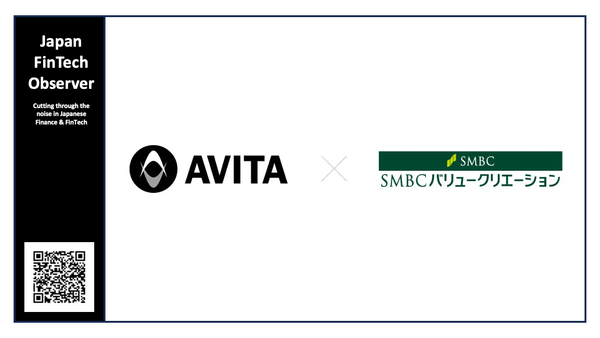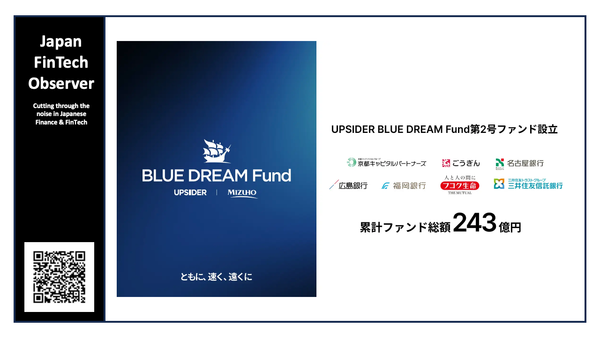Japan FinTech Observer #41
Happy New Year! Welcome to the forty-first edition of the Japan FinTech Observer.

Happy New Year! Welcome to the forty-first edition of the Japan FinTech Observer.
We were incredibly lucky starting the new year. With initial warnings of tsunami waves 5m in height, and the sight of two airplanes going up in flames, anyone would have gladly taken the odds of “just” 100 victims. Having driven the beautifully scenic coast line of Noto Peninsula just over one year ago myself, I know with some certainty where I do not want to be if such a tsunami is coming ashore: on that beautifully scenic, unprotected road with exits inland few and far in between.
I am always curious to understand how such events spur a massive avalanche of “What the world can learn from [insert country]….” social media posts, but I would simply postulate that we were lucky that the actually measured highest wave amounted to “just” 1.2m, and that the airplane fire was contained for 8 or 18 minutes (vs the initial 90 seconds evacuation news) to allow everyone to get of the JAL plane alive. Our thoughts are, of course, with the families of those who perished.
If you prefer cold, hard numbers: Ishikawa prefecture makes up less than 1% of the national GDP, and there has not been any news regarding outages at factories that are of significance for national or even global supply chains. It might have helped that most factories were closed for the holidays — or we simply got lucky.
With the new year, we will introduce a live recap of the Japan FinTech Observer. The first session is scheduled for Tuesday, January 9, starting 5pm JST. Registration is open through the Tokyo FinTech meetup group. This time slot will allow us to capture Europe & Asia, but we are open to experimentation, so if there is demand for an alternative time, please let us know.
Here is what we are going to cover this week:
- Venture Capital & Private Markets: Japan’s Government Pension Investment Fund will probably still be the largest sovereign investor by 2025, but Norway’s NBIM may take over soon after that; Japan’s Meiji Yasuda Life Insurance Company plans to invest about 600 billion yen ($4.2 billion) in domestic and overseas private assets over the next three years; the Development Bank of Japan (DBJ), Japan’s sovereign development bank, has entered into an investment agreement with 4BIO Capital; JAFCO Group, Mitsubishi UFJ Capital, SMBC Venture Capital, and Mizuho Capital participated in the USD 24.5m Series B financing round of Micoworks; SBI Investment led Indian supply chain startup Wiz Freight’s Rs 93.3 crore or USD 11.24m Series B funding round; Sumitomo Corporation and JAFCO Asia invest in Indonesian FinTech: Komunal Indonesia; leadership change at Sony Ventures
- Banking: the end of the negative interest rate policy and Japanese mortgages
- Insurance: Tokio Marine’s successes with IoT around the world
- Payments: Krungsri (MUFG Group) launches cross-border QR code payments seamlessly connecting Thailand and Hong Kong; Rakuten Card becomes available for high school students; HSBC’s Zing is not available in Japan (yet)
- Capital Markets & Asset Management: JGB issuance for FY2024 will be the lowest since FY2019, however, the amount outstanding overall will still reach an all-time high; for the first time since 2010, the Bank of Japan has not made any purchases of J-REITs during 2023; the last such purchase was in mid-2022; the amount of ETFs purchased at JPY 210 billion is also the lowest since the beginning of the extraordinary monetary easing; The Lion-Nomura Japan Active ETF (Powered by AI) is Singapore’s first actively managed ETF and Singapore’s first AI-powered ETF
- Digital Assets: Japan’s Web3 Trends in 2023/2024 by Hyperithm; Oasys and Aki Network explainers
- The Last Word: Bullish on Tuna
Japan Outlook
There are plenty of “2024 Outlook” reports circulating, and we have posted quite a few of them ourselves. For this edition, we would like to cite some passages from Michael Cembalest at J.P. Morgan Asset & Wealth Management, since he covers both a historical view (including the last year), as well as recognizes a “special situation” in the short term. You can access the full report here.

For over 15 years, Michael has written about a strategy in global equity portfolios to overweight the US and Emerging Markets and underweight Europe and Japan, a strategy he terms “the barbell”. The pro forma excess returns are illustrated in the chart above. Despite a recovery in Japanese equities and continued subpar returns in China, the barbell eked out a small positive return again in 2023. The barbell has outperformed in 84% of all three-year rolling periods since 1991 with an average positive return of 3.0% compared to an average return of -1.2% when it does not work.

Michael does see room for Japan to “equitize”, however. I would like to add that if you compare these data points over the last 20 to 25 years, they will not look dramatically different, so the question is “why now?” Michael answers with six points:
Regarding Japan: corporate governance reforms and other policies create a better foundation for investing.
- As shown in the table above, there’s a lot of room for Japan to “equitize” further
- The exit from deflation has made cash less attractive vs equities for Japanese pensions and households (real short term interest rates are -2%)
- The Tokyo Stock Exchange has threatened to delist companies trading below book value unless they enact governance reforms
- There are over 50 activist funds in Japan which is unprecedented, and they’re pummeling the corporate sector with governance proposals
- The share of companies with more than 50% independent external directors has risen from 30% to 60%
- There are tax incentives for households to increase equity allocations, and there’s pressure on Japanese pensions to align equity allocations higher to match the Government Pension Investment Fund
Michael closes with the following paragraph: “To be clear, Japan is still a very slow-growing economy with a lot of demographic and competitive pressures. Growth in 2023 was still dominated by exports rather than by domestic consumption, real wage growth is still negative, its industrial production growth is no different than Europe, and China has now eclipsed Japan as the world’s largest auto exporter. According to the Bank of Japan, the country’s potential growth rate is still less than 1% due in large part to unfavorable demographics. Our improved outlook for Japan equities is based mostly on a one-time exit from deflation combined with additional boosts from corporate governance and investment incentive policies. I doubt that will end up being a rationale that lasts for several years.”
Venture Capital & Private Markets

Projection of the top 15 sovereign investors by AuM (US$ billion)
- Japan’s Government Pension Investment Fund will probably still be the largest sovereign investor by 2025, but Norway’s NBIM may take over soon after that; China will continue to have a key role unless it changes the structure of its pools of capital dramatically, and there will be four Middle East funds in the Top 15 by 2030, including Saudi Arabia’s PIF with USD 2trn, according to Global SWF
- Japan’s Meiji Yasuda Life Insurance Company plans to invest about 600 billion yen ($4.2 billion) in domestic and overseas private assets over the next three years, aiming to expand beyond government bonds and stocks in a bid to raise returns; the diversification of assets under management will be one of the pillars of Meiji Yasuda’s new three-year, medium-term management plan that will start in April, Nikkei Asia reports
- The Development Bank of Japan (DBJ), Japan’s sovereign development bank, has entered into an investment agreement with 4BIO Capital, an international venture capital firm unlocking the treatments of the future by investing in advanced therapies and other emerging technologies, for its third fund, 4BIO Ventures III; 4BIO Capital is targeting USD 200–300m for the final close of the fund, expected to be in 2024; this investment by the DBJ represents the Bank’s first investment into a UK life sciences fund
- Vertex Growth, a growth-stage venture capital fund anchored by Vertex Holdings, a subsidiary of the global investment company Temasek, led the USD 24.5m Series B financing round of Micoworks, a developer and provider of the LINE-based MicoCloud and Micomii marketing platforms; JAFCO Group, Mitsubishi UFJ Capital, SMBC Venture Capital, and Mizuho Capital participated
- SBI Investment led Indian supply chain startup Wiz Freight’s Rs 93.3 crore or USD 11.24m Series B funding round, marking Wiz’s first funding in over 20 months
- Sumitomo Corporation and JAFCO Asia invest in Indonesian FinTech: Komunal Indonesia secures USD 5.5m in extended Series A round from Sumitomo Corporation and other existing investors like AlphaTrio Capital Sustainable Technology Fund, JAFCO Asia, Skystar Capital, Sovereign’s Capital, Ozora, and Gobi Partners
- Gen Tsuchikawa will transition into the role of Chairman of Sony Ventures, with Kaz Hadano assuming the role of Chief Executive Officer
- NAO MURAKAMI, Founder & General Partner, Incubate Fund Asia, a seed stage focused venture capital fund investing in Asia and SEA, reflects on 2023
Banking

- 70% of mortgages in Japan are of the variable type, resetting every six months; with real estate prices exceeding bubble time valuations, Loan-to-Income (LTI) ratios have been increasing from just over 3.5 to just under 4.5 times, while some banks have also introduced 50-year mortgage terms to spread out the higher cost; in line with the LTI (given rather static incomes), the loan amounts have been increasing, and the debt-servicing ratio (DSR) as well; at the same time, the mortgage volume nationally has hit all-time highs; even if/when the Bank of Japan abandons its negative interest policy, there is limited systemic risk given the projected path of interest rates, however, any increase in market rates might well eat up salary increases and hence dampen consumption
Insurance
- Matteo Carbone and Robert Pick write about the Tokio Marine successes with IoT around the world
Payments
- Krungsri (Bank of Ayudhya), a member of MUFG Group, has reinforced its leadership in the ASEAN region by extending its network connectivity through the introduction of cross-border QR code payments seamlessly connecting Thailand and Hong Kong
- Japan lowered the age of adulthood in April 2022 from 20 to 18 years, which also makes those newly minted adults legally eligible to obtain credit cards; however, many credit card companies have excluded high school students from their offering; Rakuten Card changed its terms & conditions for the new year, for the first time allowing “qualified” high school students to obtain a credit card; will others follow?
- Zing by HSBC debuted with much fanfare last week as a “Wise challenger” for multi-currency wallets and cross-border money transfers; however, the self-proclaimed “worry-free international money app” initially is a rather domestic affair, only available to residents of the United Kingdom
Capital Markets & Asset Management

Historical changes in outstanding amount of JGBs (source: Ministry of Finance)
- According to the Ministry of Finance — Japan, JGB issuance for FY2024 will be the lowest since FY2019, however, the amount outstanding overall will still reach an all-time high
- For the first time since 2010, the Bank of Japan has not made any purchases of J-REITs during 2023; the last such purchase was in mid-2022; the amount of ETFs purchased at JPY 210 billion is also the lowest since the beginning of the extraordinary monetary easing
- The Lion-Nomura Japan Active ETF (Powered by AI) is Singapore’s first actively managed ETF and Singapore’s first AI-powered ETF; with the expertise of Lion Global Investors and Nomura Asset Management, the propriety AI model evaluates hundreds of factors to uncover hidden gems with strong growth potential; the investment objective of the Fund is to achieve long-term capital growth through investment in an actively managed portfolio of Japanese equity securities, diversified across sectors and market capitalization; it will be listed on SGX Group on January 31, 2024, with Phillip Securities as market maker
Digital Assets
- Japan’s Web3 Trends in 2023/2024 by Hyperithm; in 2023, the Japanese Web3 market has seen a number of developments driven by continued support from the government and market recovery; this article will focus on the following updates that are notable for Japan this and next year:(I) Slow but Predictable Regulatory Changes, (II) Corporate Giants Finally Stepping in, (III) Global Teams Making Engagements in Japan
- The native token of the Oasys ecosystem, OAS, plays a crucial role with a diverse range of utilities, staking opportunities, and governance functions; the applications of OAS tokens differ from the perspective of users, developers, validators and delegators; understanding the subtle differences and how OAS underpins the broader economy of Oasys is the first step in understanding the extensive ecosystem and the coming developments that await Oasys and its native token
- Aki Network, a prominent web3 influencer platform, employs real-time, onchain data to track influencers’ promotion performances; beyond tracking, it actively supports organizations through its influencer campaigns, marking a departure from the conventional influencer marketing landscape; the platform’s decentralized data network, powered by Aki Protocol, ensures a level playing field for influencers of all scales — from micro to major
The Last Word: Bullish on Tuna
A 238-kilogram bluefin tuna caught in the waters off Oma, Aomori Prefecture, was sold for JPY 114.24m (JPY 480,000 per kilogram) in the first auction of the year at Toyosu Market in Tokyo’s Koto Ward on Friday, exceeding ¥100 million for the first time in four years. A marine brokerage firm called Yamayuki bought the most expensive tuna at the New Year’s auction for the fourth year in a row.
If you would like to see more of our content, please head over to the Tokyo FinTech YouTube Channel or check out the eXponential Finance Podcast.
We have also created two LinkedIn groups, the “Japan Startup Observer” if your interest in Japan goes beyond FinTech, and the “FinTechs of India” to capture the developments on the subcontinent. We invite you to join both these groups.
Have an awesome week ahead.




